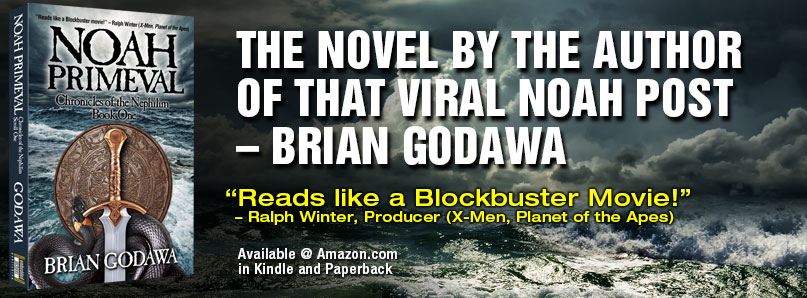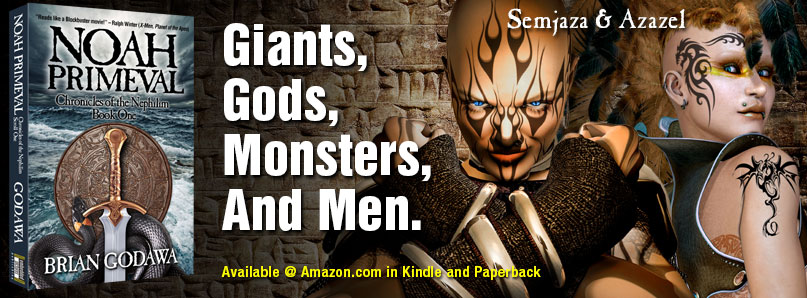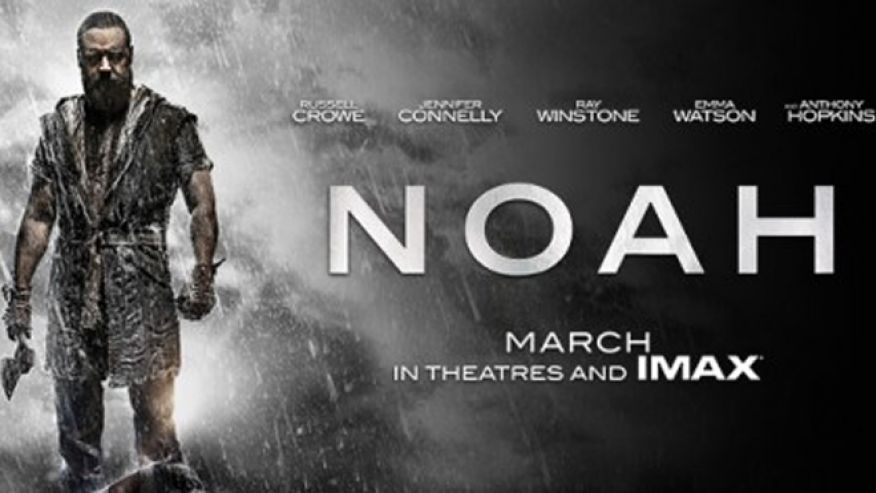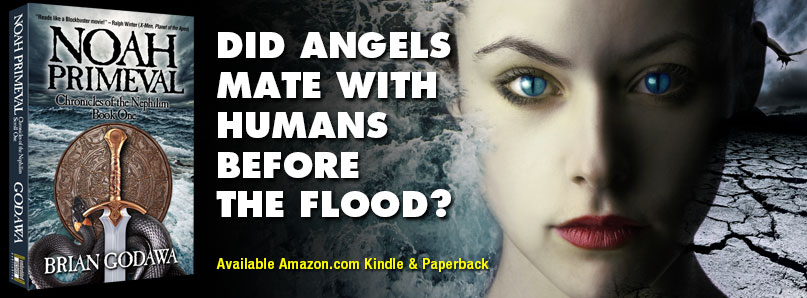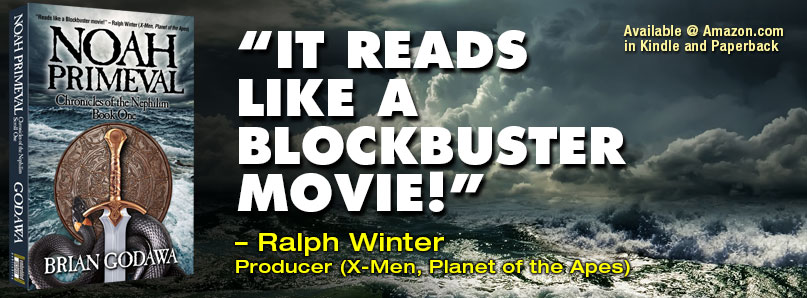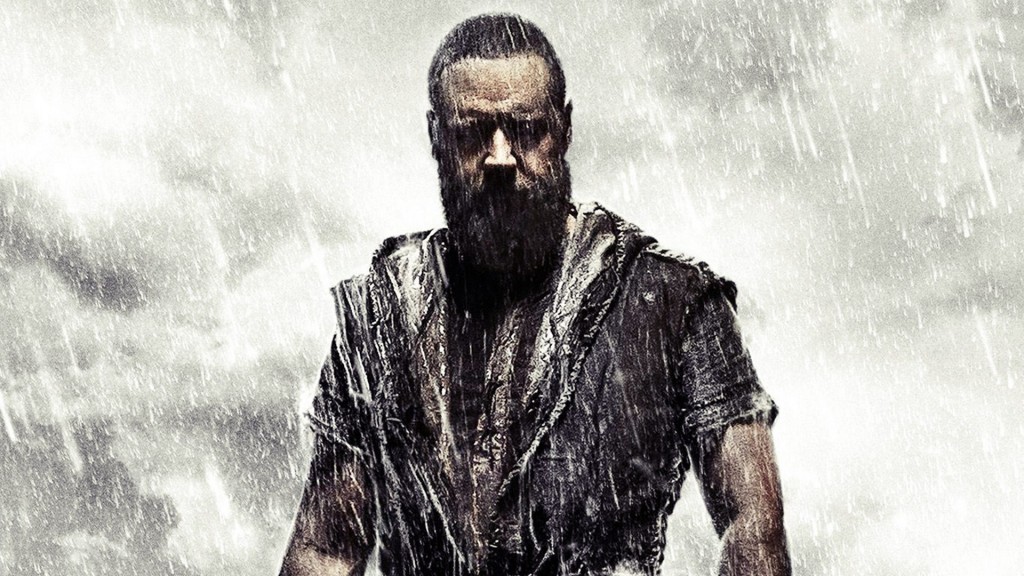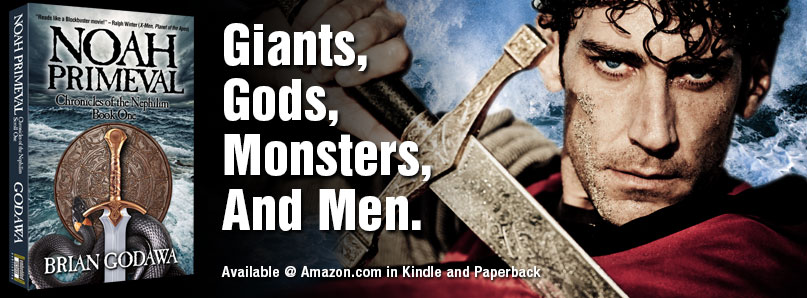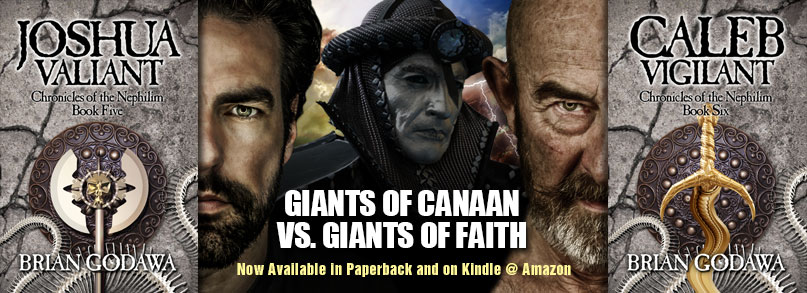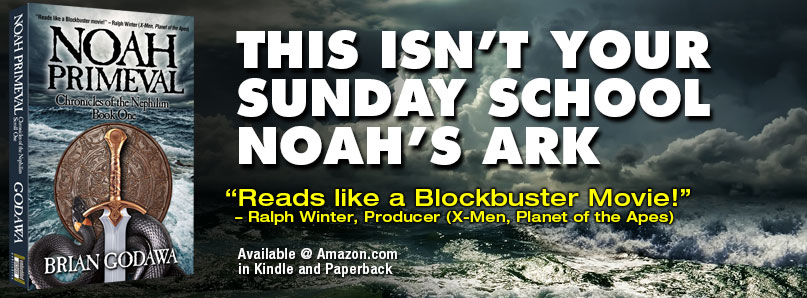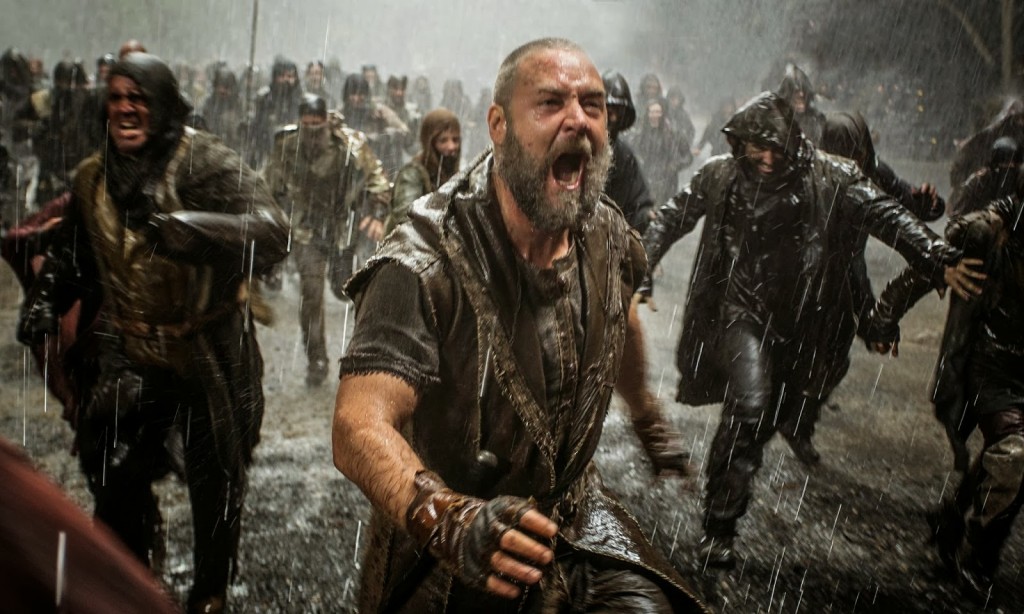
The Noah movie starring Russell Crowe is raising the topic of the Flood and just why it happened. I thought I would add to the conversation so if you watch the movie, you can do so with wisdom and discernment.
I’ve written a Biblical fantasy novel called Noah Primeval. I’ve researched this topic extensively. Noah Primeval has been a category bestseller on Amazon for 3 years. It’s first in a series of novels called Chronicles of the Nephilim.
Buy the novel Noah Primeval, here on Amazon.com in Kindle or paperback. The website www.ChroniclesOfTheNephilim.com has tons of way cool free videos, scholarly articles about Watchers and Nephilim Giants, artwork for the series, as well as a sign-up for updates and special deals.
The War of the Seed
In the older Noah script I read, (and we’ll see if it’s the same in the movie) man is depicted as violent and evil. But there is also a tie-in with the environment, as if God’s judgment on destroying the earth is predominately because man was a polluter of the environment, an obvious analogy of the modern Global Warming narrative that we Westerners are destroying the earth from our carbon emissions.
I had complained in my viral blog post critiquing the script that this was an important subversion of the original Genesis sacred story, which was NOT about polluting the environment, but about polluting the image of God in man. We will see if this message is still as strong in the movie.
But let’s take a look at what the Bible actually teaches about the issue.
In the last post, I made the point that the Watchers came from heaven and were not only seeking to corrupt and violate the heavenly/earthly divide, but to pollute the human bloodline in order to stop the coming Messiah. Noah was uncorrupted in his flesh. And guess who came from Noah’s bloodline? Israel, God’s people, and ultimately, Jesus, the Messiah (Luke 3:23-38).
So how did these Sons of God know about the Messiah so early in the primeval history? Because when God cursed the Serpent in the Garden (and that serpent is Satan, a fallen angelic being — Revelation 12:9), he said, “I will put enmity between you and the woman, and between your Seed and her Seed; he shall bruise your head, and you shall bruise his heel” (Genesis 3:15).
“Seed” means “offspring.” God here is prophesying a cosmic War of the Seed, where the “offspring of the Serpent” or Seed of the Serpent will war with the Seed of Eve. And Messiah is the ultimate Seed who would crush the head of the Serpent (Revelation 12:10; Luke 10:17-20). Jesus is called “The Seed” to whom God made his promises (Galatians 3:16).
So since the fallen angels knew about this prophecy through Satan, who was one of them, it would make sense that they would seek to corrupt that Seedline of Eve with their own seed to stop Messiah from coming, by corrupting God’s image.
In Judaism, the high priest was the one who mediated between men and God. But there was a problem that had to be fixed. And that was that the high priests were also sinners who needed to atone for their sins as well, over and over.
So the system was imperfect. It needed a perfect sinless high priest to atone for sins once and for all. It needed a God-man hybrid.
Think about it. The whole point of the Messiah was that he would be fully human in his flesh, but fully God in his “seed.” This is why the Virgin birth is so necessary. If his human flesh was already tainted by fallen angelic seed, then he could not be fully human. But the mediator between God and man must be fully human, uncorrupted flesh like Noah, or he cannot mediate for humans. In the same way, the mediator had to be fully God or he could not mediate on God’s behalf.
Look at this New Testament passage and see that reality expressed through Jesus being a “high priest” who sacrifices for our forgiveness or atonement:
Hebrews 7:26–28
For it was indeed fitting that we should have such a high priest [Jesus], holy, innocent, unstained, separated from sinners, and exalted above the heavens. He has no need, like those high priests, to offer sacrifices daily, first for his own sins and then for those of the people, since he did this once for all when he offered up himself. For the law appoints men in their weakness as high priests, but the word of the oath, which came later than the law, appoints a Son who has been made perfect forever.
The fallen Watchers were trying to corrupt the bloodline of Messiah with their own mocking pre-emptive tainting of the Seed of Eve with the Seed of the Serpent. This War of the Seed is exactly the story I try to tell in my Chronicles of the Nephilim, starting with Noah Primeval.
But What Does the New Testament Say?
The New Testament confirms divine/human cohabitation as evil and worthy of punishment because it actually alludes to this very violation of fleshly categories and resultant punishment in 2 Peter and Jude. If you compare the two passages you see the sensual violation of human and angelic flesh that we read about in Genesis 6:
2Pet. 2:4-10
For if God did not spare angels when they sinned, but cast them into hell (tartarus) and committed them to chains of gloomy darkness to be kept until the judgment; if he did not spare the ancient world, but preserved Noah, a herald of righteousness, with seven others, when he brought a flood upon the world of the ungodly; if by turning the cities of Sodom and Gomorrah to ashes he condemned them to extinction, making them an example of what is going to happen to the ungodly;… then the Lord knows how to rescue the godly from trials, and to keep the unrighteous under punishment until the day of judgment, and especially those who indulge in the lust of defiling passion and despise authority.
Jude 6-7
And angels who did not keep their own domain, but abandoned their proper abode, he has kept in eternal chains under gloomy darkness until the judgment of the great day— just as Sodom and Gomorrah and the surrounding cities, which likewise indulged in gross immorality and pursued strange flesh, serve as an example by undergoing a punishment of eternal fire.
Both these passages speak of the same angels who sinned before the flood of Noah, and who were committed to chains of gloomy darkness. 1 Peter 3:19-20 calls these imprisoned angels “disobedient.” According to our study, the angelic sons of God are revealed as sinning in Genesis 6, so these must be the same sinning angels referred to by the authors of the New Testament.
Both Peter and Jude link the sin of those fallen angels with the sin of Sodom and Gomorrah, which is described as indulging in “gross immorality” by pursuing “strange flesh.” The Greek word for “gross immorality” (ek porneuo) indicates a heightened form of sexual immorality, and the Greek words for “strange flesh” (heteros sarx) indicate the pursuit of something against one’s natural flesh. The angels who visited Sodom were clearly spoken of as enfleshed in such a way that they were physically present to have their feet washed and even eat food with Abraham and with Lot (Gen. 18:1-8; 19:3).
Angels on earth can have a physical presence. Bible students know that the men in Sodom were seeking to engage in sexual penetration of these same angels who visited Lot in his home. So here, men seeking sex with angels is a violation of the heavenly and earthly flesh distinction that the Scriptures seem to reinforce – a replay of Genesis 6.
Some Christians believe the passage is referring to homosexuality, but it’s not so much that. Peter and Jude link the angels sinning before the flood to the violation of a heavenly and humanly separation. The New Testament commentary on Genesis 6:1 affirms the supernatural view of the Sons of God as angels having sex with humans.
So, who exactly are the “Seed of the Serpent”? Ultimately, they are all those who are on the side of Satan, just like the “Seed of Eve” would be all those who are “in Christ” or on the side of Messiah.
In a previous post, I explained that the people in Canaan were considered from the cursed line of Ham. We know that the Canaanites worshipped evil gods and engaged in child sacrifice and all kinds of moral perversions. So the Canaanites are considered the Seed of the Serpent for one.
But there is more to it than that. Because the Nephilim of Genesis 6 were the hybrid offspring of the sexual union of angelic Watchers and humans. So just who were these Nephilim, these literal Seed of the Serpent? I’ll explain in the next post.
Buy the novel Noah Primeval, here on Amazon.com in Kindle or paperback. The website www.ChroniclesOfTheNephilim.com has tons of way cool free videos, scholarly articles about Watchers and Nephilim Giants, artwork for the series, as well as a sign-up for updates and special deals.

